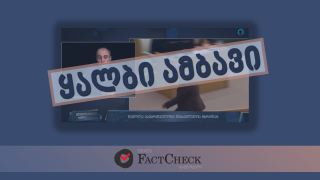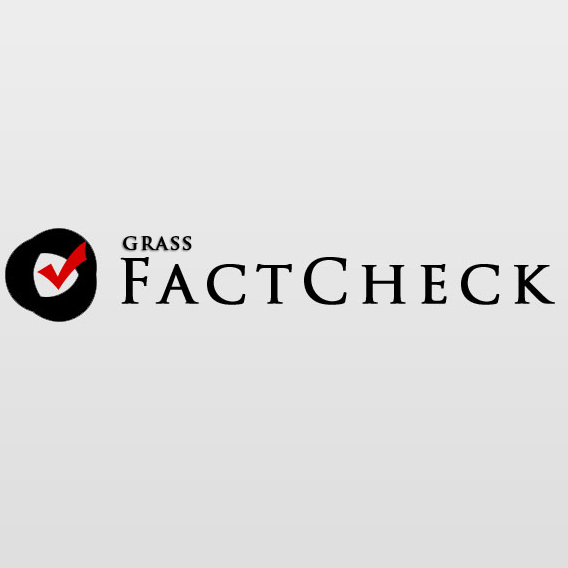On 24 August 2022, on air on Alt-Info’s talk show, Alternatiuli Khedva, anchor of the show, Tatia Gabritchidze, stated: “Over the course of nine years, from 2003 to 2012, there was not a single election whose legitimacy was brought into question. More precisely, all elections were rigged 100% owing to Levan Tarkhnishvili. We remember the nailed up door of the CEC, we also remember those public protests which followed those rigged elections. However, nobody can recall at that time a single diplomat or observer who came forward and said that elections were conducted with unacceptable violations.”
In fact, Tatia Gabritchidze’s statement that none of the foreign diplomats or observers has ever said that elections were conducted with violations vis-à-vis elections held in 2003-2012 is not true and aims to discredit Georgia’s strategic partners. In reality, election-related violations were sharply criticised many times prior to 2012 and the Georgian Dream’s coming to power.
The 2008 presidential elections, observed by monitors from the OSCE’s Office of Democratic Institutions and Human Rights (OSCE/ODIHR) together with representatives of other international institutions, prompted one of the most critical assessments under the previous government.
According to the final report of the OSCE/ODIHR Election Observation Mission, while the election was in essence consistent with most OSCE and Council of Europe commitments and standards for democratic elections, it also revealed significant challenges.
The report highlights that although the latest amendments enacted in the Election Code appeared to address a number of recommendations offered in the OSCE/ODIHR and Venice Commission, “there remain pertinent inconsistencies, gaps and ambiguities throughout the Election Code which leave room for uncertainty and divergent legal interpretations by the stakeholders.”
The document also draws attention on pressure and intimidation during the election campaign, targeting public servants and the opposition activists, which was proved by the observation mission itself several times. It was noted vis-à-vis the election campaigns that the distinction between state activities and the campaign of the ruling United National Movement (UNM) party candidate, Mikheil Saakashvili, was blurred.
The OSCE/ODIHR mission stressed the biased nature of TV companies; in particular, TV stations that carried out campaign coverage lacked balance with the ruling party candidate generally receiving the most coverage. It is also underscored that Imedi TV, one of the largest private broadcasters and considered to be pro-opposition, was taken off the air.
In accordance with the observation mission, voting was assessed positively by a large majority of the observers, although it was at times disorganised and chaotic in a considerable number of precincts. “Organisational and procedural shortcomings were observed, especially with regard to the inconsistent application of inking procedures intended as a safeguard against multiple voting. Observers also reported a limited number of serious violations, including ballot box stuffing.”
It was assessed by the OSCE/ODIHR observers that the vote count and tabulation, as well as the process of hearing post-election complaints and statements seriously endangered fulfilling of certain commitments before the OSCE. The report reads that many precinct election commissions had problems completing the results protocols.
“IEOM observers reported cases of tampering with voter lists, results and protocols. The tabulation process at the DEC level was slow and often chaotic. Several DECs reported a turnout considerably higher than the national average.
There are harsh assessments in the report vis-à-vis complaints as well. According to the observation mission, only a limited number of official complaints were filed during the pre-electoral period, almost all against the ruling party and its candidate. It was also indicated that the CEC and courts tended to stretch the law beyond reasonable interpretation and without regard to its spirit in favour of the ruling party candidate and public officials. After election day, the election administration and the courts did not fully and adequately consider and investigate a considerable number of complaints regarding irregularities, some of which were of a serious nature.
The OSCE/ODIHR observation mission issued equally critical report about the Parliamentary Elections held on 21 May 2008.
According to the OSCE/ODIHR report, certain positive changes were made to the Constitution and Election Code two months prior to the elections. However, a number of important issues remained unaddressed. In particular, the Election Code contained provisions which created an unequal playing field in favour of the ruling party, the United National Movement. The report concluded that “gaps, inconsistencies and ambiguities in the Election Code impeded its effective implementation.”
The mission also negatively assessed the CEC’s work. In particular, it was highlighted that the CEC did not act in a collegial manner. In addition, on contentious issues, CEC members failed to act independently as required by law and decisions were voted on along political lines. At times opposition-nominated members were excluded from DEC activities.
The observation mission also touched on issues of intimidation with many of such cases confirmed by the OSCE/ODIHR “including a number of verified cases of pressure exerted by local officials on opposition supporters, including, in particular, teachers, to desist from campaigning.”
The report stressed that the distinction between state and party was frequently blurred: “There were cases of state officials conducting official duties in combination with campaign events of United National Movement majoritarian candidates or government social programmes being combined with UNM campaign activities.”
According to the same report, IEOM observers reported numerous cases of local observers and party proxies being intimidated and pressured on election day or being ejected from polling stations and DECs.
The International Election Observation Mission issued a critical assessment vis-à-vis hearing complaints and appeals and stated that the election administration and courts for the most part did not give due consideration to complaints and appeals with an apparent bias in favour of the United National Movement and public officials. The report reads: “In various cases, they refused to hear witnesses or view documented evidence, failed to address all relevant facts, applied unsound interpretations of the law, ignored the spirit of the law or failed to provide complete or clear factual-legal reasoning.”
Overall, voting was assessed positively by a large majority of IEOM observers. However, certain shortcomings and serious violations, including ballot box stuffing, were reported.
As opposed to voting process, the tabulation process was assessed particularly negatively by many IEOM observers. Specifically, the report says that number of violations have been identified in regard vote count and tabulation process, including serious irregularities.
The document reads: “There were widespread and significant irregularities in the handling of these complaints by PECs and DECs. The summary protocols of 38 PECs were annulled by DECs and courts, mostly for serious irregularities. In adjudicating complaints on DEC summary protocols, the CEC and courts improperly refused to consider the validity of PEC summary protocols.”
The 2008 report of the US Department of State’s Bureau of Democracy, Human Rights and Labor is equally critical. In regard to elections and political participation, US Department of State emphasises that elections were held with serious irregularities and underscores significant problems, including widespread allegations of intimidation and pressure, flawed vote counting and tabulation processes and shortcomings in the complaints and appeals process. The report also says that according to the international observers’ conclusion, the parliamentary elections on May 21 were uneven and incomplete in their adherence to international standards.
Given all of the aforementioned, it is clear that a claim that not a single diplomat or observer from 2003 to 2012 talked about “inacceptable” election-related violations is not true. The OSCE/ODIHR reports cited in this article prove that international observers (both parliamentary and presidential elections in 2008) voiced their criticism from almost every angle. In particular, the reports highlight shortcomings and irregularities such as intimidation and pressure, improper use inking, ballot box stuffing, the biased nature of the CEC, etc. In addition, both reports equally harshly criticized the complaints and appeal adjudication processes and state that neither the election administration nor the courts properly considered complaints and appeals and showed a clear bias in favour of the ruling party and public officials.
----------------------------------------------------
This article was produced as part of Facebook’s Fact-checking Programme. Given the rating, Facebook may impose different restrictions – click here for full information. For information on issuing a correction or to dispute a rating, please see here.







